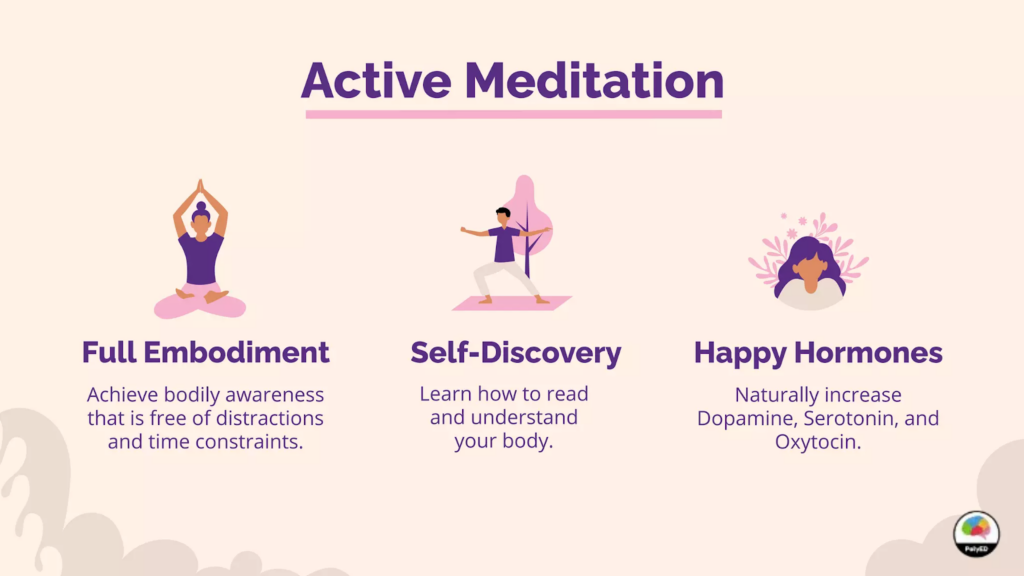
Have you ever thought to yourself: “Am I meditating correctly?” Meditation is a powerful practice with many positive effects, but sometimes people don’t know how to tell if they’re doing it right. This can be frustrating and cause them to lose interest or quit altogether. Determining whether or not we are meditating correctly is important in order for us to get all that this ancient art has for us. So let’s talk about why your meditation needs to be on track.
What are the signs that meditation is working?
Signs that meditation is working include a calm mind, reduced stress, and increased focus. You may also experience greater self-awareness, emotional stability, and improved sleep.
That shows the meditation is having positive implications for both mental and physical health and can enhance the quality of life. Regular meditation practice is often associated with reduced anxiety and improved mood and can, therefore, make ordinary challenges easier to handle.
Improved mindfulness during various activities and the presence of a feeling of peace from within are also signs of a good meditation process. Through consistent practice, you will feel more attuned to your inner self and enjoy deeper insights, which surely will validate the purpose of meditation.
How long does it take to feel the effects of meditation?
The effects of meditation can be felt in as little as a few weeks with regular practice. Initial benefits include relaxation and stress reduction, while long-term practice leads to enhanced focus and emotional resilience. Consistency is key to experiencing the full range of meditation benefits.
Besides, many beginners report a sense of great calm and clarity of mind that was unknown to them before the session was over. Over time, the sum total of these experiences will make possible more permanent changes that last long and changes in emotional well-being. This varies between individuals; nevertheless, regularity definitely improves the rate and depth of change that meditation offers.

What should I feel during meditation?
During meditation, you might feel a sense of relaxation, focus, and detachment from distracting thoughts. Physical sensations like warmth or tingling may occur as you become more present.
These experiences tend to vary between individuals because they appear to be person-specific responses to achieving the meditative state in which they become aware of their Self. Some feel peace at the moment, others experience restlessness first and then slowly become calm.
Your breathing slows down and becomes rhythmic, helping to attain a relaxed state. These feelings, when accumulated over time, contribute to a greater understanding of oneself and a more mindful approach to life.
How can I tell if my meditation is improving?
Improvements in meditation are marked by increased focus, longer periods of mental calm, and enhanced self-awareness. Over time, you’ll notice reduced stress responses and a more positive outlook.
Consistent development in such habits would suggest that meditation practice is really developing into something deeper and more effective. Distractions become less invasive over time as you progress in your meditation practice and the depth of your concentration increases.
What are common challenges faced in meditation?

How do I stay focused while meditating?
To stay focused during meditation, concentrate on your breath, use a mantra, or visualize calming images. Set a consistent practice schedule to build discipline. Gentle redirection of wandering thoughts back to the focal point helps maintain concentration and enhances the effectiveness of your meditation sessions.
They can also be supported with mindfulness techniques, such as body scans or guided meditations. It also becomes an ease to concentrate once the physical environment is created, which is peaceful and with no distraction. Both practices build up one’s ability to stick with focused attention and deepen your experience to eventually get into a state of calm and mental clarity.
How can I measure the success of my meditation practice?
Success in meditation is measured by improvements in mental clarity, emotional resilience, and daily mindfulness. Personal growth indicators include increased patience and reduced stress.
Reflecting on these changes over time can help assess progress, emphasizing the personal and transformative nature of a consistent meditation practice. Things that substantiate success differ from one individual to another; some find themselves being creative or engaging in better interpersonal relationships.
Reflections noticed and unnoticeable, are recorded by journaling and setting mindful intentions along the way. Many of the subtle benefits of meditation unfold over time, so focusing on the journey itself and what it can contribute toward overall well-being, rather than a fixed, measurable outcome expected in a given period of time, is very important.
Embrace the Process of Meditating
To tap into all its power, you have got know if you are doing it right or wrong! By identifying signs showing that we are meditating incorrectly and adopting proper methods while avoiding typical errors; individuals can greatly improve their meditation skills thus reaping maximum benefits from this practice. Always remember that patience plus persistence equals success in everything, similarly, with meditation, there is no end point so enjoy every moment of it!
